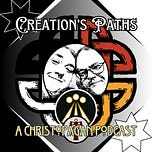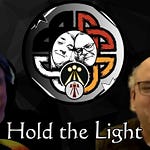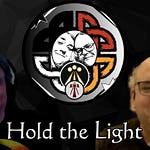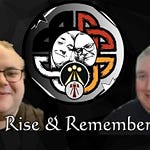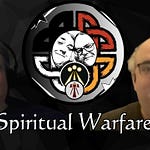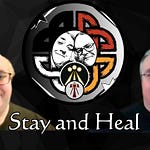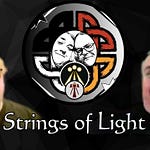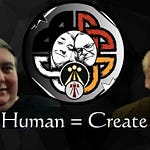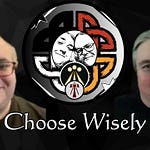Join Charlie, a non-binary sci-fi fantasy writer, and their husband Brian, as they commemorate the transfiguration of Christ on Mount Tabor. This episode explores the presence of Jesus alongside Moses and Elijah, the significance of this event in Christian mysticism, and its relevance to modern believers. Through thoughtful discussions on law, prophecy, justice, and the essence of divine light, Charlie and Brian encourage listeners to find personal meaning and practical wisdom in this sacred narrative. Engage in a deeper understanding of the balance between law and prophecy and the transformative power of divine illumination.
Support us on: https://ko-fi.com/cedorsett
Become a patron of the arts patreon.com/cedorsett
For Educational Resource: Wisdoms Cry https://wisdomscry.com
For all of the things we are doing at The Seraphic Grove go to Creation's Paths https://www.creationspaths.com/
BlueSky https://bsky.app/profile/creationspaths.com
Threads https://www.threads.net/@creationspaths
Instagram https://www.instagram.com/creationspaths/
Transcript:
Today as we celebrate the transfiguration of Christ and imagine the divine Christ. Between Moses and Elijah on Mount Tabor. We have a lot of questions that pop up. What does this mean for us today? Why is this such an important, and I would say almost a vital part of the story?
Blessings in light to everyone out there. Hello, my name is Charlie. I am a non-binary scifi fantasy writer. Today we are celebrating. The memorial of the transfiguration of Christ. This is a story that we can find in the new Testament and is one that has inspired mystics and visionaries throughout the history of Christianity.
I think, we'll find very impactful in our own discussion today. I'm joined by my wonderful husband, Brian.
Good day.
This is a big, deep, meaty topic. I'm glad that it's on the calendar every year, because this entire podcast could just be about this one moment and we could do seven days a week hours and hours a day and not exhaust everything that happened.
If you're not familiar with the story, It's very simple. Jesus and three of his disciples Peter, John, and Andrew go up on a mountain to pray. They wake up in the middle of the night and there's a blinding light on the top of Mount Tabor. They look over and there is the fully divine Christ sitting on the mountain, talking with Moses and Elijah. And they really don't know what to do. In fact, I believe it's Peter.
Who said, should we make up tents for our guests? And Jesus is like, No.
But thanks for asking.
it's this moment that kind of happens and passes. It seems almost an interjection into the story.
What actually happened here? What is the importance of this? On a basic level the transfiguration shows us Jesus in the line of profit and law-giver. We see him with Moses the quintessential law giver, the one to whom the Torah was given. That all of the commandments were given. And we have kind of this reenactment of the events on Mount Sinai. And we have a, Elijah the quintessential profit .
A profit that walked with God so much that he does not die. A great chariot swings, low picks him up and carries him away into heaven. So again, the quintessential prophet.
Just a quick little side note in here, because it kind of cracks me up. Elijah is also, very much about lessons of hospitality. It just cracks me up that the first default thought was hospitality, with proposing, do we need to build a tent or set up a tent for them? Even though. non-corporeal doesn't necessarily need a tent, but hospitality first, it just cracks me up and there's always a great lesson to take in everything, that one's default thought should be hospitality just cover your bases.
We have these three very important people. People who are all attributed to these three mountain experiences, we have Jesus on Mount Tabor. We have Moses from Mount Sinai. And we have a Elijah who is very connected with Mount Carmel. in fact, it's on Mount Carmel that Elijah sees God. One of the most powerful passages in all of scripture and a story, we will be referring to a lot, forever. And should probably do a full episode on at some point. God walks by and there are three things that happen. There was a mighty wind. But God was not in the wind. There was a fire and God was not in the fire. There was an earthquake and God was not in the earthquake. And then a still small voice came to Elijah.
I've always found this image very powerful in that when we think of Moses on Mount Sinai.
We think of this big, booming voice, right? For those of us of a certain age, we go back to a certain Charlton Heston movie.
I am the Lord, your God. Right. It's very booming voice, which is very much associated with the law. Loud booming. Declarative voice. And Elijah who heard the still small voice. The quiet voice and there in between the two is Jesus the Christ in the fullness of his glory.
Now we can get into some of the theological questions and stuff that come around with this moment, but, to me the most important lesson I learned from here is the Christ as the pivot point between these two things. The law which is quite literally for Moses written in stone. The 10 declarations are, as they're often said in English, the 10 commandments, literally carved into stone.
And Elijah. The prophet. The justice maker, the one who engages in good trouble. The most prolific slaughterer of. People in the entire scripture, which is why people like me always speak of Elijah with great reverence. Because people who are familiar with the story of Elijah and the profits of ball. They say their prayers, they say their prayers and when elijah brings fire down on his stack and the profits of ball, don't. Elijah then pulls a sword and kills 500 profits of ball.
We'll talk about that later Elijah is a bit scary and in legend becomes increasingly scary because Elijah having never died occasionally shows back up in stories. And is always there to as Brian said, judges, the hospitality of the place that he goes to.
woe and to you, if Elijah finds you wanting.
The profits are the voices of justice.
The law is not always about justice. I think this is where we get things confused. The law is about righteousness. When we are talking about the law, we're talking about what is right and what is wrong. We're talking about ethical codes, moral codes. How you should govern yourself and how you should govern a society.
That's what the law is. The law is not interested in justice. It should be the embodiment of justice. It should be written justly. But. a, human actor has to make justice happen.
I like to think of the law as it's like any structure whether that's a building, a wall, a door. It exists. It gives structure and form to the environment. But it is not necessarily just, it is not necessarily right or wrong. That wall will obstruct passage and flow of air , and everything else, good or bad. But it does give structure.
Continuing this trend that we've been on this month with the podcast, talking about peace and peace making. There we have Jesus in the middle. And I feel like this is the embodiment of both the law giver and the pro and the prophet. As Jesus famously said in the sermon on the mountain, not one jot or tittle. Not one little dot or a line. Which shall pass from the law until all is fulfilled.
What is the law? You should love the Lord, your God with all your heart, mind, and spirit, and you shall love your neighbor as yourself. The law is love. But this is very rigid. It is love. Not hate, not anger, not fear. And he walks this line between the law giver. Which we see on the sermon on the Mount. And the prophet who is going about interfering with injustice. see a person about to be stoned. And he says, okay. That's what the law demands. This person be stoned. So whoever's without sin cast the first stone.
Hmm. That makes you have to stop for a minute. And look at the harshness of the law. Jesus is constantly pointing at the harshness of the law. Why is there divorce according to Jesus, because of the hardness of our own heart. Because we enter into relationships that maybe we shouldn't maybe we're mean to each other and were cruel to each other. There are many, many reasons for a marriage to end, but if we were perfect embodiments of love and compassion, There would be no need for divorce.
We would find the person that we loved and we would love them and we would be a perfect love and romance, novels, happy, ever. Afters would be ubiquitous for all. But that's not who we are as a species. So many of us have that hardness of heart. Relationships break and they fall apart
Jesus is bringing about this new modality. This new way of acting. And that we are told not to judge. Judge not lest you be judged for you shall be judged by the same measure that you yourself apply. Ooh. This is why I personally don't care what people get up to in their personal lives. But if they're always harping about morality, and getting into everybody else's sex lives and they have a messy one themselves. I find myself talking about it. Because I don't really care what most people are doing in their privacy of their own lives. But you keep saying that you are some Paragon of justice, now I care. It's the hypocrisy that makes me care and we are judged by the standards that we apply.
There is also a second part of that. This is where prophecy being able to see the divine be able to participate in those divine energies really comes to the forefront.
Jesus tells us to. Not try to take the mote out of our brother's eye. Before we take the log out of our own. What's all that about. Well, the evils that we impute to others are often, not always, but often the flaws we see in ourselves. We're often projecting our own insecurities fears, inadequacies, lapses on to others. And in, so we're telling ourselves. I'll be quite honest. I talk a lot about compassion and our need for compassion because. That is not something that comes natural to me. Compassion is something I had to learn and actively practice. I would not say that I am perfect at it. When I don't believe that anybody's perfect at anything, but I have rage in me. I have anger in me. I'm not somebody who holds grudges. That's not the way that I act, but. if I am not careful in monitoring who I am and how I'm interacting with people, compassion. Isn't always the place that I operate from. I see this as a failing in myself and thus project out. We need compassion. We need confession. You see the St. John Lennon, John Lennon also had this problem and one of his most famous songs, right. All you need is love. Because, yeah, this is a fault he saw in himself that he tried to make better and tried to get better. In his case, I think it is something that he did improve on over time.
It is in this as well that we can glean a useful motivational tool. It is in our nature to want to judge others for things. Using that desire. That urge. Sublimating that energy. Into and redirecting it back into yourself. To use that as energy to give yourself fuel for self-improvement. It's quite a powerful tool. Often, when driving, find myself being like, oh, this person's being a jerk or don't drive like a, expletive. I tend to get worked up by other drivers. On my better days, I take a moment. Take that breath for peace and let it go and then I also remember to take that energy that was built up in wanting to judge others, to reflect it back upon myself and realize. Why am I driving as fast as I'm driving? Why am I cutting these people off? Why did I just change lanes five times between two stoplights? It's unnecessary. It's excessive. I'm the one driving like a jerk. I'm the one cutting people off. I'm the one driving too fast. And whether I am quote unquote, driving safer, it's not for the debate at that point in time. It's a lame excuse. I need to fix myself first. Using that as motivation is helpful in fixing myself because it's stuff that I want to excuse. I like doing that. I like going fast . That's fine, but I need to use it, to stop myself from judging others. And redirect that energy so that until I'm driving calmly and sanely and not like a jerk. I cannot judge others on that.
Mount Tabor really is the place where we start confronting a lot of this. a lot of early Christian mysticism is based off of this image. Here it is. As important to Christian mysticism as is Ezekiel's vision of the divine chariot is in Jewish mysticism. It is pivotal to this. And they're on. Mount Tabor. We see the Shekinah glory of God.
The light shining that we are told was in the tabernacle when they were wandering through the desert. This Shekinah that filled the temple when it was initially blessed by following this light, this glory of God. The Covad . The glory. The hush mall. Of God. Is there. In their presence. It's terrifying. Because in the bright. Un yielding light. There's nowhere to hide. All of your faults are laid bare. All of your imperfections are laid bare. If you wonder why. Your favorite newscaster podcast or starts using soft light more and more and more as time goes on. its because soft light doesn't show wrinkles. The softer, the light. The less likely you are to see the effects of aging, right. Harsh light, bright light shows all imperfections. If there's the slightest wrinkle in your clothes. The harsh light will show it. And that really is. The experience. Why. The tremendous and fascinating mystery when you encounter the divine. That shakes us to our core. Is you realize there's nothing to hide. There's nowhere to hide. There's nothing. That you can cover up here.
This is what the apostles are seeing. The apostles are the stand-ins for us in this moment where they're just like, Uh, Guys.
Moses and Elijah are here. And Jesus has kind of glowing. There's light everywhere. It's important for us to realize there's always light. Everywhere.
You glow. I glow. It's subtle. It's soft. Our eyes. Don't pick up on it. Well, because it is so faint. But one of the things that we know because of the nature of our bodies and the way the chemistry. The biology and the physics work within them. Every human clothes, just biologically Glos. We don't have to get into subtle matter. And all of the things, spiritual things here. You glow. There is a light about you. I would also agree with Yoda, luminous beings. Are we not this crude, matter. That light is always around us. And in that light, we realized that we are all intrinsically the same. We are all striving for a life that is free of sorrow. That is full of joy. That grants us a sense of fulfillment. And we might not all pick the best or even the right way to do it.
But we all have that commonality that. Unifies us. In spirit and in. Reality.
Staring at this immage and I highly recommend. You just take some time in meditation. And just imagine it for yourself. You can use a picture. If that helps you find your favorite painting. There are millions of them probably. Scenario, because it is such a famous moment from the gospels. Or just allow your imagination to be what it is.
Let Moses look like, whatever you want Moses to look like. let Elijah looked like whatever you want Elijah to look like. Let Jesus look like whatever you want Jesus to look like.
Let the mountain. Look like what. Whatever you want it to look like you don't need to go. Find Mt. Tabor on Google earth and see what the actual landscape looks like. Just let yourself be in the moment. What arises for you? What does this look like to you? And how do you feel. In that light in that place. As this great. Illumination this base. Illumination is flowing up. Where the one life is erupting like a fountain into the world. Reminding us that the true path. That we walk. Is not. The righteous path of the law.
The justice making path of the prophet. It's that path in the middle. It is that middle way. That place in between where we have to not only remember the letter of the law, but the spirit. What is the justice that needs to be done here. What is the goodness that needs to be done here? What is the truth that needs to be done here? We're not always looking for. That booming. Loud Cecil B DeMille. Voice of God. Booming from the heaven.
Which by the way, if you really want to see how good he was at. Making that happen. He actually made a silent film version of the 10 commandments before he made the Charlton Heston, Yule Brenner one.
It's a silent film. And. You will actually understand a line from the Torah very profoundly. And it says that their eyes heard. They saw the voice of God. Because there's no sound. It's a silent film. But he does such a good job in conveying the imagery there. You can hear the thunder. You can hear the lightning, you can hear the booming voice. Which is a.
Sign of just how good he was as a filmmaker.
This is a moment. Foundational. To our mysticism. To our. When I use the bad R word. Religion. Remember I use religion in the Roman sense of the term. It's religio it is. The link. What links us back. What links us again? What links us together? In this moment, we see the tradition. We see Moses, we see Elijah, we see the Christ. We see the future. Here's Peter, John and James. We see the future. The future of the past and the present all together in one place. We're forced to start asking ourselves. What is our future? What is our past. What. Traditions are we going to hold on to, this is really the power of the profits. The profits are the pruning sheers of faith. When you actually look at the Hebrew prophets. Right. You read the law of Moses. The law of Moses is very clear. We use this knife to kill this animal and use this ladle to put this blood on this, alter it.
I mean, step by step instructions on how sacrifice works. And then we get to the profits. And through the mouth of the profits. Hear the voice of the Lord. I do not want to or sacrifice. I want your love. That is a pruning shear. Being taken. To the faith. That is a pretty sure being taken to the law. The law is very clear. On this day, we bring these animals to this place to do these things. From Blom Blom Blom Blom.
For me, it was one of the greatest revelations. When. Going through different traditions and looking at. Everything it was recognizing. There's the core. There are those. Few things and it should be very few things that are essential. It's like in life. You have to eat. You have to drink water.
You have to breathe. There are those essential things. Those are the things that you allow to be your law.
But everything else. Is personal practice. That is the prophetic element. That is, the justice making element. And it's recognizing that is. Personal. And you can share the other trappings with others. Through the different traditions that link you back. It's not essential.
It doesn't matter. The ladle you use is not core. Sacrifice. It's not core. It's the love. That's core that needs to be in all of it.
But the rest. And then the profits helped. to. prune that. And help to put into context. That, oh, this is not essential.
As we said at the very beginning, what was the law that Jesus gave. Oh, master. What is the greatest commandment?
You will love God. With all your heart. Mind and being. And you love your neighbor as yourself.
And there it is.
How the hell can you love somebody else? If you don't love yourself, there you go, it's also very profound. Very true. It's very true.
That is the core of everything that we're doing. And. When you ask yourself, how do you love God with all your heart, mind, and spirit again god is our aliveness.
We are called to live. God. God is our aliveness.
Inner radiance.
Love being alive. Love you are aliveness live. To the best of your ability and you are. Showing that love and affection for God. That is what we really see here. This just fount of life. Pouring forth on mountain table.
We bask in the radiance of that tabernac light. And this is something that a lot of Christian . mistics. Talk about. And if you've ever experienced this in meditation, it is such a profound experience that. Occasionally there you are. You're sitting with your eyes closed and deep meditation. And you just find yourself surrounded by light. It's just there. It didn't suddenly appear. It was always there. You just didn't see it. We distract ourselves so much. And I think one of the more interesting things is we see this conversation. In the gospels between Jesus Moses and Elijah.
I want to bring that challenging moment up here.
was that really a one-time thing. or is everything that Jesus did a conversation between him, Moses and Elijah. Between him the law and the profits. Was just that just one moment? Where everything was just right enough that the veil slipped. And people could see. That discourse happening. Because from my point of view yeah. This is just that moment where it was visible. Not a unique moment in time. I think you can see that discourse on. The Mount of olives later in the story, and you can see it on the sermon on the Mount earlier in the story.
You can see it all the way through. You can see it. In Jesus, when he is assaulted by the man possessed by many demons. And Elijah. Comes out in him and he wrestles him to the ground. And cast the demons out.
It's in the moment. Of the fishes and the love just before the fishes and the loaves. When the community has brought the problem before Christ. And Jesus has that moment.
the law says, cast them out. You can weed that, that crowd down really easily.
justice says, hospitality says, feed them all. Or feed. As many as you can.
So as we sit here, Remembering. The transfiguration.
This moment where we get to see this glimpse of the divine Christ, the cosmic Christ. The one who Paul tells us. Holds the cosmos together.
Hold that vision in our minds. Really ask ourselves how we can participate with it. How we can find more moments of that divine light. And how we can. Walk this path between the law and the prophets. More fully. In our daily lives.
I hope you've gotten something out of this. I hope that. Something we have said has moved something in you and we would love to hear for you. You can reach out to us through our community over at sub stack. Just go to https://www.creationspaths.com/. And click on the chat tab. You can leave your questions, comments, and anything. There. You can also comment on this post over there and keep the comments over there. However you want to do it. You can also reach out to me. I am https://bsky.app/profile/creationspaths.com on blue sky and https://www.threads.net/@creationspaths. Over on threads and Instagram. But we'd love to talk to you. About this. And answer any questions you might have. If there's any way that you can help support us and keep us doing what we're doing. You can join our community over at https://www.creationspaths.com/ for all of our paid members, there are classes coming. That will be first behind. The paywall so that we can make sure that we're giving special attention. To those who are taking them and make sure we're asking, answering any questions that are asked. And everything, but they will go out to the wider community later.
So don't worry about it. If you don't have the money. Right now. Don't hurt yourself. Never hurt yourself. In giving to us or anybody else.
They're going to go wide afterwards. We're just going to start. With the paid audience and then spread out from there.
And if you're hungry for knowledge. There is https://wisdomscry.Com. Which has a lot of wonderful information and articles on a wide, incredibly wide variety of topics. And an ever-growing treasure trove of knowledge and information. , as more and more articles go up regularly.
thank you so much for being here. And has always made the blessings and light of God ever shine upon you. That you may find the path that you should walk. Amen.
Amen.


